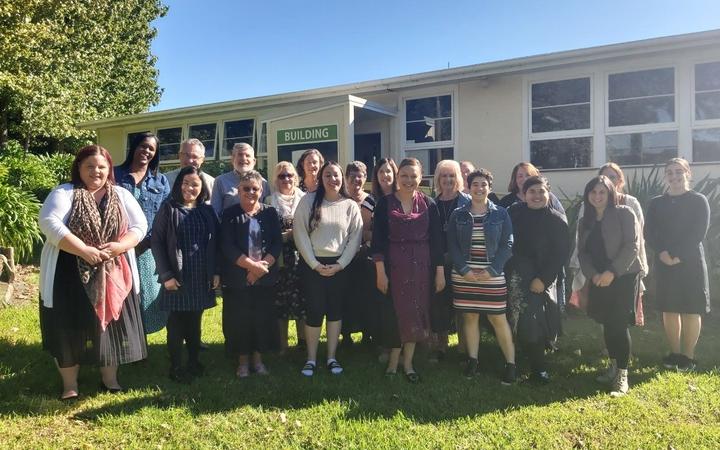Iwi and iwi health providers pushing for earlier Covid-19 vaccination for Māori over the age of 50 are at the same time searching for ways to deal with vaccine hesitancy.

Ready, willing and able – 20 new recruits to the Whanganui vaccine campaign. Photo: Supplied / LDR
Whanganui District Health Board (WDHB) has delivered 4000 doses of the Pfizer vaccine, mostly to border workers, frontline health staff, and rest home, police, fire and prison workers. People over the age of 65 will be offered vaccination in the next rollout phase, due to begin this month.
Iwi health authority Te Oranganui chief executive Wheturangi Walsh-Tapiata said Māori working with the DHB continued to advocate for Māori over 50 to be included in the next phase. But she said the flipside to the issue was dealing with reluctance among many Māori to get the jab.
“I still think there’s a whole lot of reticence out there in our communities about even having the vaccinations. What are the messages that we need to be giving to our communities to encourage them to come and have the vaccine?
“We’ve got a bit of work to do on messages that will help answer the questions for our whānau and help them decide that they want to be part of this vaccination.”
She said misinformation and the relative newness of the vaccine were at the root of uncertainty in Māori communities.
Many concerned about the risk of adverse reactions were watching and waiting, but Māori in Whanganui were not anti-vaccination as a rule. Last year’s flu immunisations in the Whanganui region topped the country for Māori over the age of 65, she said.
“We did a very, very good piece of work there, going out to communities, holding drive-through clinics, day, night and weekend clinics. But this is not flu immunisation – we’re still coming to terms with this particular [Covid-19] vaccination and what it means for us. At this point, we’ve still got a lot of hesitance.”
Walsh-Tapiata said she was looking for messages from iwi and community leaders to encourage people to get vaccinated.
One message that was reaching whānau centres was on protecting the rest of the family.
“If you vaccinate yourself, you are part of the protection mechanism for your whānau,” Walsh-Tapiata said.
“If I vaccinate myself, I’m part of protecting my mokopuna who are under the age of 16 who live in my house. That has been a very persuading factor.”
Walsh-Tapiata said the DHB’s Hauora ā Iwi relationship board and the Māori Health Outcomes Advisory Group of iwi providers were working with the DHB to finalise the Covid-19 rollout locally and to address issues that are critical to Māori communities.
The WDHB said more than 50 extra staff had been recruited and more would come on board as the campaign progressed, to put two doses in the arms of nearly 55,000 people by the end of the year.
WDHB communications manager Mark Dawson said some of the newcomers brought years of experience, but others had never worked in the health system before.
“All will go through an intensive training programme, whether they are going to be vaccinators, support staff or administration workers handling bookings and documentation,” Dawson said.
Among a recent group of arrivals at Whanganui Hospital was Feilding-based Mary Gilbert, a registered nurse for 46 years, having seen service in England and, latterly, as a district nurse in Taranaki.
At the other end of the scale was Brazilian Daniela Reis, who has been in Whanganui for three years. Having had experience in customer service, she was looking for a job in administration.
Louise Allsopp, who leads the Whanganui vaccine rollout team, said Whanganui would continue to build up its Covid-19 vaccination workforce.
“All these new recruits – whether they be newcomers or former colleagues – are most welcome, and they will play an important part in the biggest public health project we have ever had,” Allsopp said.

Local Democracy Reporting is a public interest news service supported by RNZ, the News Publishers’ Association and NZ On Air.